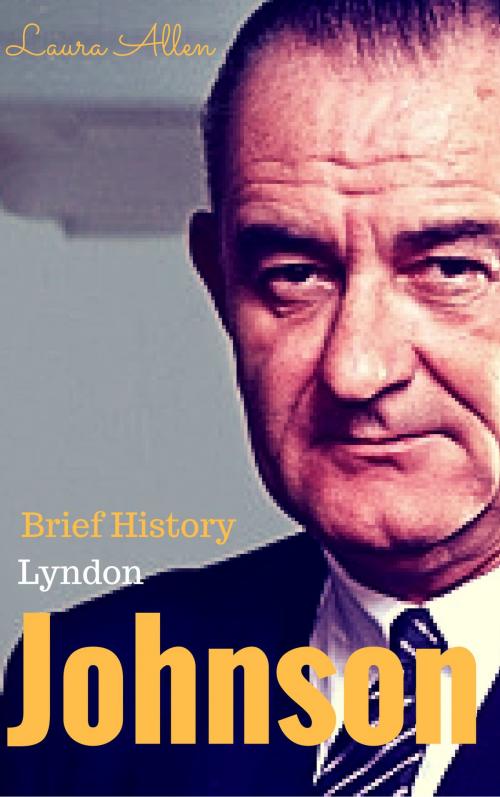| Author: | Laura Allen | ISBN: | 1230001215830 |
| Publisher: | Alan MOUHLI | Publication: | July 5, 2016 |
| Imprint: | Language: | English |
| Author: | Laura Allen |
| ISBN: | 1230001215830 |
| Publisher: | Alan MOUHLI |
| Publication: | July 5, 2016 |
| Imprint: | |
| Language: | English |
Lyndon Baines Johnson, known by his initials LBJ, born August 27, 1908 in Stonewall (Texas) where he died on 22 January 1973 was an American statesman, 36th President of the United States (1963-1969), after having been the 37th Vice President (1961-1963). It is one of only four individuals to have served in all four federal elected offices of the US representative, senator, vice president and president.
Democrat, Johnson is representing the United States of Texas from 1937 to 1949 and US senator from 1949 to 1961, including six years as majority leader of the US Senate two years as opposition leader in the Senate and two years as majority whip in the Senate. After trying in vain to get the presidential nomination of the Democratic Party, he accepted the proposal of John F. Kennedy to be his running mate for the 1960 presidential election Democrat ticket wins narrowly against the Republican ticket led by Richard Nixon.
The same day of the assassination while in office by John F. Kennedy on November 22, 1963 he reaches the US President in his capacity as Vice-President. He finished the Kennedy presidency, and was elected on his own behalf, outweighing the 1964 presidential election His term was marked by violent race riots and political assassinations, including that of Martin Luther King. Johnson sees the political program of "Great Society", which includes laws that support civil rights, public broadcasting, protection of the environment, aid to education. He launched a program of "war against poverty", creating the Medicare and Medicaid and in August 1965 signed the Voting Rights Act. Controlling behavior of Johnson remained famous, including his famous "Johnson treatment," by which he physically imposing to his interlocutors and he has often abused even face the most influential politicians to force them to accept its laws
Simultaneously, it must manage the first part of the Vietnam War, where US involvement intensifies. As the war continued, the popularity of Johnson significantly decreases. After the election at the 1966 Congress, assuming a reelection Johnson for president 1968 seems compromised by the turbulence that causes the opposition to the Vietnam War within the Democratic Party. After the New Hampshire primary, in which it is put in trouble, he gives up representing. Despite the failures of his foreign policy, a number of historians draw a positive balance of his presidency because of reforms that prepared in domestic policy.
Lyndon Baines Johnson, known by his initials LBJ, born August 27, 1908 in Stonewall (Texas) where he died on 22 January 1973 was an American statesman, 36th President of the United States (1963-1969), after having been the 37th Vice President (1961-1963). It is one of only four individuals to have served in all four federal elected offices of the US representative, senator, vice president and president.
Democrat, Johnson is representing the United States of Texas from 1937 to 1949 and US senator from 1949 to 1961, including six years as majority leader of the US Senate two years as opposition leader in the Senate and two years as majority whip in the Senate. After trying in vain to get the presidential nomination of the Democratic Party, he accepted the proposal of John F. Kennedy to be his running mate for the 1960 presidential election Democrat ticket wins narrowly against the Republican ticket led by Richard Nixon.
The same day of the assassination while in office by John F. Kennedy on November 22, 1963 he reaches the US President in his capacity as Vice-President. He finished the Kennedy presidency, and was elected on his own behalf, outweighing the 1964 presidential election His term was marked by violent race riots and political assassinations, including that of Martin Luther King. Johnson sees the political program of "Great Society", which includes laws that support civil rights, public broadcasting, protection of the environment, aid to education. He launched a program of "war against poverty", creating the Medicare and Medicaid and in August 1965 signed the Voting Rights Act. Controlling behavior of Johnson remained famous, including his famous "Johnson treatment," by which he physically imposing to his interlocutors and he has often abused even face the most influential politicians to force them to accept its laws
Simultaneously, it must manage the first part of the Vietnam War, where US involvement intensifies. As the war continued, the popularity of Johnson significantly decreases. After the election at the 1966 Congress, assuming a reelection Johnson for president 1968 seems compromised by the turbulence that causes the opposition to the Vietnam War within the Democratic Party. After the New Hampshire primary, in which it is put in trouble, he gives up representing. Despite the failures of his foreign policy, a number of historians draw a positive balance of his presidency because of reforms that prepared in domestic policy.















